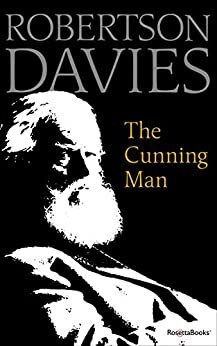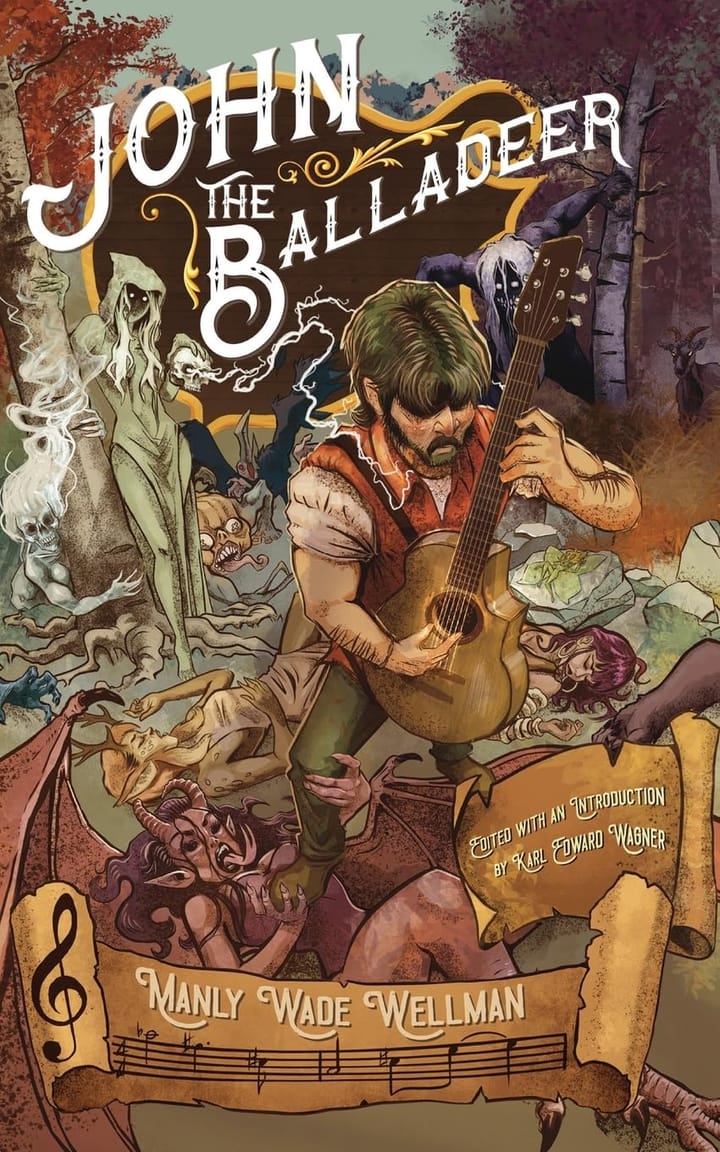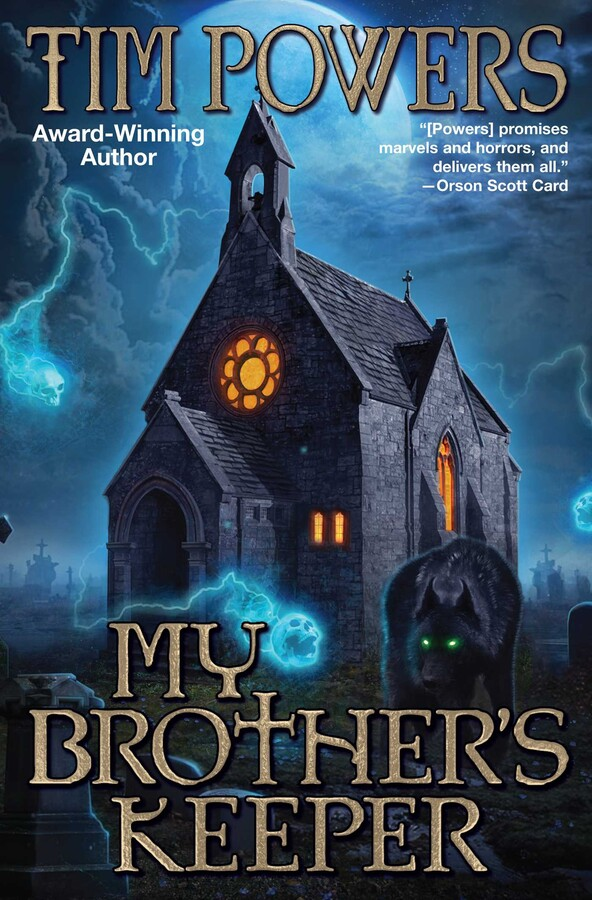The Long View: The Cunning Man
This is why I do this. Coming back to this barely remembered book review after many, many years is much like reuiniting with an old friend. I can see in these paragraphs things I have said, and things I have thought, forgetting their true source. This post is a rich vein of the insights that I have applied over the years.
John liked Robertson Davies for the same reason I like Tim Powers, he was an author you could use to cleanse your palate after reading some modern drivel. There is something disheartening about so much modern fiction, that it is a real joy to read a book that doesn't drag you down. John notes that while Davies was never opposed to modern culture as such, Davies managed to avoid modernity's worst excesses by looking beyond modernity to what is inevitably to come.
Davies' novel is grouped where it is in John's blog because it is thematically related to Tradition, the political embodiment of the perennial philosophy. You could read John's post as an indictment of Tradition, but mostly I think he wanted to draw attention to something that possesses latent power, and his review of The Cunning Man seeks to draw out the good there is to be found in the perennial philosophy, much as Davies looked for the good in modernity.
John felt that the perennial philosophy at its best was far from the worst possible world, but probably also not capable of achieving the best. Graceful despair was how he characterized it, perhaps most memorably embodied in the Stoicism of Marcus Aurelius. However, John clearly also felt that the hermeticism of the perennial philosophy could conjure a world that none [or almost none] of us really want.
Searching for the even better alternative was John's ultimate purpose, and by extension it is now mine.

The Cunning Man by Robertson Davies Viking Publishers, 1995 $23.95, 469 pp. ISBN 0-670-85911-7
The Breath of Coming Winter
Some years ago, for reasons that seemed sufficient at the time, I read Doris Lessing's great novel, "The Golden Notebook." The novel takes the form of a long, agonized memoir by a progressive young woman in the middle of the 20th century, in which the protagonist tries to come to grips with the political and sexual struggles of her time. This really is a great book. It succeeds like few other works in conveying to the reader the dismay and self-disgust of the modern mind. Then I happened to read Robertson Davies' novel, "The Lyre of Orpheus," the first of his books I had ever encountered. Reading it was like being cured of an abscessed tooth. Since then, I have been reading everything by him I could find.
I don't think that my reaction to Davies is altogether unique. Many people find his prose to have the same curative effect. His books breathe compassion and an intelligent sense of history. In contrast to so much of what goes on in fiction these days, his vision seems to capture the light of sanity. In his latest book, "The Cunning Man," he puts a fittingly old name to this light: the perennial philosophy. (This term has been variously defined, but perhaps Aldous Huxley's book, "The Perennial Philosophy," comes closest to an extended exposition of what Davies means.) Today, many people speak of the end of the modern era, and some even say it has already ended. They call our time "the postmodern age." This is nonsense, of course. Postmodernism is merely a satirical epilogue to modernity. Robertson Davies, though often accounted a somewhat old-fashioned author, shows us in his books one of the spiritual regimes that could actually succeed modernity when it does end. If so, it will be better than we deserve. Even now, however, with modernity still largely undismantled, it is not too early to begin to understand that the perennial philosophy is in essence a form of graceful despair.
"The Cunning Man" consists of a series of reflections and character sketches, held together by a loose account of the life and times of one Dr. Jon Hullah, master diagnostic physician of the city of Toronto. There are three stories here: Hullah's school life and professional career, the growth of the cultural life of Toronto to world-class status, and a cautionary tale about the dangers of orthodox religion. The doctor, like so many other characters in Davies' books, is a wizardly man, a bachelor and a bit of a misanthrope with some odd intellectual interests. After a boyhood in the Canadian north and a tough-but-fair elite boys' prep school, he has an early infatuation with Freudian theory when it was still new and not particularly respectable, at least in Canada. He has some occasion to put this interest into practice while treating "friendly fire" casualties during World War II. Back in civilian life, the doctor develops into a physician in the tradition of Paracelsus. This means that, in practice, he learned the value of just listening. He is, of course, perfectly expert in scientific medicine, but he tends to take his science as a metaphor. There are genuine mysteries in the case histories of his patients. To illustrate this, he has a bas relief of a caduceus on the wall of his waiting room. Its two intertwining snakes symbolize empirical science and "wisdom" respectively, while above both is written the Greek word for "fate."
The health of every individual, the doctor believes, is as unique as each soul, and so is every disease. The point is not that all diseases are psychosomatic; they aren't. However, the conditions to which the body is prone are usually expressions of the mind, and the patient's state of mind is of critical importance to the success of any therapy. Dr. Hullah acquires a quiet but wide reputation as a "diagnostician of last resort," a physician whose results other doctors cannot quite explain and which they usually have the sense not to ask about. His clinic, it happens, is located in a building in close proximity to a high episcopal church.
At the time of the main action of the story, St. Aidan's was a very high episcopal church indeed, with a congregation that provided a good social cross-section of Toronto. In those glory days, its pastor was the saintly Father Hobbes, a man who literally went hungry to feed the poor. We meet him as he sinks in his last years into a pious and well-beloved dotage. Though the pastor was willing to accommodate elaborate ritual practice, the church's splendid liturgies during the late period of his tenure were the work of the parish's sophisticated music directors, and even more so of the curate, Fr. Iredale, one of Dr. Hullah's old schoolmates. The artistic life of the church was greatly enriched by, indeed it really only reflected, what went on next door in Glebe House. This old mansion had once been parish property, but came into possession of two representatives of another stock type in Davies' books, the Lovable Lesbian Artists. Called the Ladies, they were friends with their tenant Hullah (his clinic is located in a building that had been Glebe House's formidable stone stable). Starting first with artistically-inclined people at St. Aidan's, they came to host a weekly salon that attracted most of the musicians and plastic artists of the nascent artistic world of Toronto at midcentury. (The Ladies invited few writers, since writers proved to drink too much.)
Lest anyone miss the moral, this arrangement is supposed to illustrate the fruitful relationship that art can have with religion. The artists themselves are in large part infidels and persons whose private lives do not bear close scrutiny, yet their community is created by the need of the church for music and vestments and sculpture. Once assembled, they develop their art according to its own needs, but the church continues to benefit from the new creations it has neither the funds nor the imagination to produce itself. During the Golden Age of St. Aidan's, faithful parishioners like the Ladies and Dr. Hullah do not of course believe in the tenets of orthodox Christianity. They are attracted to the church because they intuit that there is a dimension of Being beyond the material. They see that the Good is often the occasion for the Beautiful, as illustrated by the beautiful ceremonies presided over by the genuinely admirable Fr. Hobbes. They are, however, too sophisticated to believe that the Good must also be linked to the True. The Gospel taught at St. Aidan's is a kind of significant poetry. To think otherwise is a bit of naivete that might be tolerated in simple people, but which leads to disastrous results in the hands of men with intellect and imagination.
Such, unfortunately, was Fr. Iredale. Everyone agreed that the pastor was a saintly man. His curate, however, inspired by private visions he could not dismiss, came to regard Fr. Hobbes as a living saint in the most literal sense. The book is in small part also a murder mystery, so it would not be appropriate to set out here just what steps the curate took to prepare the pastor for canonization. Fr. Iredale wanted nothing less than that for the late Fr. Hobbes: a shrine, a cult, and finally official recognition of sainthood by the whole Anglican communion. The cult of Fr. Hobbes was to save not only Toronto, but the whole of North America. The problem, the curate soon found, was that the enthusiasm he had whipped up could not be kept within church walls. One of Dr. Hullah's truly psychosomatic patients declared herself cured by the lately deceased saint's miraculous intervention, and began preaching in the little graveyard by Glebe House where he was buried. She attracted dangerous crowds of those whom Fr. Hobbes had helped in life, street crazies, thieves and invincible alcoholics. (The Unworthy Poor are another staple of Davies' fiction. Here they take the Orwellian name of "God's People.") The bishop of Toronto, alarmed at the disorder and credulity at St. Aidan's, sends his favorite hench-cleric to preach on the dangers of ritualism. Fr. Iredale is banished to a parish in the farthest north. There he must listen to the private revelations of his landlady and try to adapt to a poor rural congregation (actually six small ones at various widely-separated churches). He takes to drink and becomes himself one of God's People, eventually dying in Dr. Hullah's care.
We learn of all this as Dr. Hullah explains it many years later to his godson's wife, an investigative reporter in Toronto. (Newspaper journalism, like the theater and the academy, is yet another stock feature of Davies' fiction. He has, after all, had significant careers in all three professions.) Thus, we get to look at these events from their aftermath. One Lady has died and the other moved away. In any event, the artistic life of the city has become too large and too commercial to fit into one of their artistic evenings. St. Aidan's has become a parish of the rich and tonedeaf. Dr. Hullah has stopped accepting new patients. We see him planning a great literary study for his retirement, a compendium of medical diagnoses of the great characters from literature, based on their spiritual conditions as set out in the texts.
We are given various hints that these personal things are not all that is ending. The doctor's indispensable nurse-therapist, for instance, is a great reader of Toynbee and Spengler, especially the latter. The era of classical modern culture with which the doctor literally grew up seems to be drawing to a close with his career. As a doctor, he has less and less faith in contemporary science, even as metaphor. AIDS and cancer research go on and on, costing ever more but yielding few results. Even the old diseases he thought conquered as a young man are staging comebacks. The suspicion grows that the whole business of research is just that, a business, perhaps finally a bit of a racket. One of his old friends discourages him from making a bequest to a university unless he attaches strict conditions. Otherwise, the greedy scientists will eat it up without licking their lips. Like the monasteries of Henry VIII's time, the laboratories have become bloated and corrupt. The time is coming for a cleaning out.
Robertson Davies has never set his face against the trends of the modern world. Insofar as modern culture has had a strong psychoanalytical component, his novel "The Manticore," which deals with a course of Jungian analysis, may someday be seen as one of the key texts. His novel "The Lyre of Orpheus," which deals with a university production of an original opera about King Arthur, is open to the possibility that there may be worth in today's experimental musical styles. In "The Cunning Man," he even manages a few kind words for feminism, of a sort. Though he clearly prefers some cultural usages of previous periods to those of the twentieth century, he has always been willing to acknowledge whatever good the world has on offer. Still, he suggests that modern culture, at least as it has been known in Canada, is drawing to a close. There is no Spenglerian gloom associated with this development. Empires may crumble and the arts go into hibernation, but the wise do not despair. Every historical era is equally far from God, but the perennial philosophy is there to console us in each.
Davies' idea of enlightenment seems to bear a certain family resemblance to that of the English novelist and former Oxford philosopher, Iris Murdoch, who has been promoting a brand of moderate Platonism for years. The reference point of Murdoch's philosophy is not a personal God, but the abstract Good. The Good, of course, issues no orders, but informs every choice we make, even those that deliberately contravene it. It does, if you will, set the agenda. It does not punish, but reality exacts a price from those who do not seek the Good, which is also the ultimately Real. Popular religion provides a form of the Good that can be understood even by people without a philosophical education. For the mass of mankind, the search for the Good can be reduced to a set of crude injunctions. This is at least sufficient for the purpose of maintaining social order. Sophisticated minds, however, will usually find that, as they climb the ladder of moral perfection, they will eventually no longer need a personal God in order to understand the Good. They need not then abandon God, but may continue to cherish Him as a metaphor. Indeed, Murdoch is a great promoter of High Church practices. As limited beings, we need symbols to help compose our minds to higher things. Ritual links us to the past and so to each other; it helps constitute society. Murdoch is the kind of Anglican who cares little whether her priest believes in God, but a great deal whether he reads from a Bible other than the Authorized Version.
There are a number of flaws one might find with an idealism so chilly. For one thing, a lot of people with expensive philosophical educations, such as St. Augustine and C.S. Lewis, found that the Good was a steppingstone to God and not the other way around. In any event, Davies' philosophy (to the extent it can be derived from his novels) is much less desiccated than Murdoch's. Davies has, for one thing, a strong taste for the merely uncanny. Although there is little actual magic in his books, there is great deal of talk about astrology, alchemical philosophy, and archetypes of one kind or another. These factors are hardly an impediment to sales in today's intellectual climate. He does favor his readers with significant coincidences, effective curses, the odd ghost (his last novel, "Murther and Walking Spirits," was a posthumous narrative by a murdered man) and one memorable case of the Evil Eye. One way of looking at the supernatural is that it is just a plot device that got out of hand, but one of Davies' attractions is that his use of it makes his fiction feel more realistic. Some people all their lives, and others during one or more vivid passages, sense a purpose or presence behind everyday life. Modernity, unlike most cultural periods, has been dedicated to dismissing this intuition as an illusion, or to explaining it in material terms. Davies' kind of realism does not do this. His vision, which perhaps reached its clearest expression in his deservedly-best selling book, "What's Bred in the Bone," can claim the designation "perennial" with some justice.
A taste for the uncanny is a long way from a religious perspective, of course. The uncanny can be a source of bad as well as good, of horror as well as illumination. If you believe in C.G Jung's idea of luck, the "synchronous event," then you must believe in the possibility of bad luck and inescapable ill-fortune. The ultimate that we sometimes sense beneath the surface of our lives is not necessarily friendly. Those characters who seek to understand it, like the diabolical old Jesuit in Davies' "Fifth Business," may be merely entertaining. On the other hand, like the nihilist monk Parlebane (another Anglican ritualist) in "The Rebel Angels," they can become formidable monsters. This view is not a kind of Manicheanism, the idea that there are independent and roughly equal forces of Good and Evil in the universe, each perhaps with its own god. Rather, it is the suspicion that God is both good and evil, that He and the devil are the same thing as seen from different angles. A God of this kind might be respected, and probably should be placated. However, it just presents another problem for human life, it is not a solution to anything.
All of this, Evil Eyes and intuitions of Being and so on, may be gross superstition. For that matter, maybe the Good and the cult of the Authorized Version are subtle superstition. The fact is, however, that educated people in most times and places who did not accept the formal theology of a major religion believed something like this. Even the secular Enlightenment of the eighteenth century was suffused with "hermetic" ideas of this type. They are, if you will, the "default position" for the sophisticated human mind, a kind of historically-informed skepticism that gives no special priority to materialism. For over two hundred years, the progress of scientific theory (and only secondarily of the technology incorporating it) has kept these ideas at bay. Today, one may argue, this perennial philosophy is returning. The problem is not that science has failed. It has almost succeeded in everything it set out to do. We understand much of the chemical aspects of biology. Even the progress of cancer research is not quite the shell-game Davies seems to think it is. We may soon have a Unified Field Theory short enough to write on T-shirt. Even before we have complete solutions to these problems, however, we know that they will not be enough.
What is true of physics is also true of morality. Nietzsche promised us a thorough-going reexamination of all values, and damned if we did not get it. Today, the experiments have all been run, and it is pretty clear to all but the most obtuse observer that the only alternative to something like the traditional systems of ethics is no human life at all. The alternatives will simply kill any society that tries to adopt them. We know what we set out to discover, and now it remains only to implement our findings. To this extent, perhaps, the future is not problematical.
What is problematical is the atmosphere in which this reconstruction will occur. It is easy to imagine a transition in which "secularism" gradually ceases to mean materialism and comes to mean something very like the perennial philosophy. This would make sense. The excitement of modernity being over, it only follows that the more relaxed "default" position would kick in. It would not be the worst thing that could happen, but one can't help but wonder whether it would really be the best. The perennial philosophy is, after all, not really very optimistic about the world or about mankind. It is not ambitious to do things that has not been achieved before. Its highest value is order. Of course, in the terminal stages of modernity, order is nothing to be sneezed at. In the final analysis, however, I think that we will finally come to see that order is not enough, either.
Copyright © 1996 by John J. Reilly
Support the Long View re-posting project by downloading Brave browser, and then trying it out. With Both Hands is a verified Brave publisher, you can leave me a tip too!



Comments ()